Index relies entirely on the support of donors and readers to do its work.
Help us keep amplifying censored voices today.
[vc_row][vc_column][vc_column_text]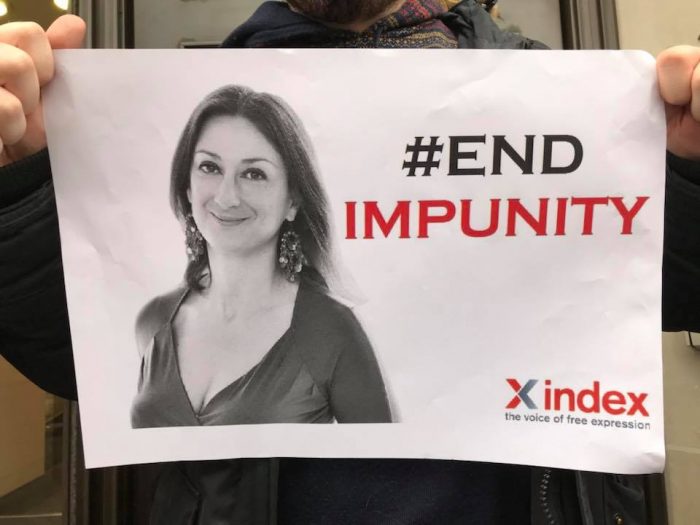
Journalists who dare to investigate powerful people or companies are facing increasingly expensive legal threats to stop them publishing.
Daphne Caruana Galizia, the Maltese investigative journalist who was assassinated in October 2017, was just one reporter who fought against these lawsuits. Strategic Litigation Against Public Participation (Slapp) lawsuits are not new nor are they limited to the media world, but they are incredibly powerful.
Daphne’s son Paul said: “Slapp lawsuits are designed to remove the truth from circulation by making it too expensive to assert. Malta’s political and business elite used them extensively against my mother Daphne Caruana Galizia who always stood her ground but, as an independent journalist, paid a heavy price in terms of stress, time wasted and money spent on her own defence.”
Leading freedom of expression advocates are worried about the power of these lawsuits and the way they are being used to stop publications.
Jodie Ginsberg, CEO of Index, said: “Having a media that is free to investigate corruption and abuse of power – and free to publish the results of those investigations – is fundamental to democracy. These vexatious lawsuits – deliberately aimed at preventing journalists from carrying out such work – must be stopped.”
Jonathan Price, a barrister with Doughty Street Chambers, said: “Media plurality and diversity are essential to a functioning democracy. But bloggers, citizen journalists, small-scale specialist publications and NGOs are most vulnerable to Slapp activity. A large corporate entity or wealthy individual is able to outspend and out-resource these independent media outlets well before any substantive court decision as to the merits of a particular case. All parties are aware of this inequality of arms, and just that simple awareness is enough to deter many small publishers from investigating and reporting on large corporates and wealthy individuals.
He added: “So there is the visible, practical censorship that is achieved by tying media organisations (of all sizes) up in spending time and money on possibly baseless litigation. And there is the self-censorship applied by the smaller publishers so as to avoid the dread of receiving a lengthy, highly aggressive letter from expensive libel lawyers.”[/vc_column_text][/vc_column][/vc_row][vc_row][vc_column][vc_column_text]A small Maltese news outlet, The Shift News, is fighting against Slapps and campaigning for legal changes in Malta to give more protection to journalists covering public interest stories. Opposition MPs in Malta are seeking to use a private member’s bill to change the law to stop international lawsuits being used to prevent Maltese journalists covering stories.
This comes after The Shift News was threatened with a lawsuit for an article about the alleged involvement in a scandal by the company Henley and Partners, which has been awarded a multi-million dollar contract to act as agent for a scheme through which Malta makes European citizenship available. Henley and Partners threatened legal action against The Shift in the UK and the US unless an article about the company’s alleged involvement in a passports-for-cash scandal in Grenada was removed. Henley and Partners deny any wrongdoing. The Shift News refused and instead published the threatening letter.
These kind of lawsuits are a problem in other countries too. For example, Albanian investigative journalists Besar Likmeta and Aleksandra Bogdani were sued for defamation by an influential judge and his wife. The journalists work for reporter.al, an investigative reporters’ platform in the Albanian language.
Fighting such lawsuits is extremely expensive – far too much for all but the largest media outlets. The result is censorship doled out by those with money: news and articles fail to appear, without anyone realising what has happened. Journalists are even told they must not mention these lawsuits or they will face further legal action.
A cross-party group of MEPs are now calling for new EU legislation to deter such lawsuits. “We are committed to the protection of investigative journalists and media freedom across the EU and will pursue this issue until Anti-Slapp EU legislation is in place,” they said.
Flutura Kusari, legal advisor to the European Centre for Press and Media Freedom, said that “in a Slapp lawsuit, the plaintiff does not aim to win a case, rather than to intimidate and discourage reporters from further reporting by placing them in long and costly judicial processes”.
There are some signs that the European Parliament is worried about the problem in a damning report recently published after a delegation of MEPs visited Malta. It identified many failings, including concerns about the effectiveness of the fight against corruption, with few investigations resulting in criminal prosecutions, and the weak implementation of anti-money laundering legislation. “The brutal assassination of Daphne Caruana Galizia was aimed at instilling fear in everyone, especially those involved in investigating and prosecuting cases of money laundering and corruption,” it said.
This is not just a problem in Europe, but in the USA there is some protection for journalists against vexatious legal actions. According to the Reporters Committee for Freedom of the Press, some US states, including California, Georgia and Texas, have laws that discourage lawsuits.
The use of expensive lawsuits to stop journalists reporting a story with a strong public interest is not a new tactic, but we must redress the balance against media investigations.
Joy Hyvarinen is head of advocacy at Index on Censorship[/vc_column_text][/vc_column][/vc_row][vc_row][vc_column][vc_basic_grid post_type=”post” max_items=”4″ element_width=”6″ grid_id=”vc_gid:1516373343229-cbca273b-69ee-8″ taxonomies=”18782″][/vc_column][/vc_row]
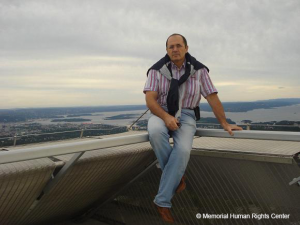
Oyub Titiev
We, members of the Civic Solidarity Platform (CSP), are deeply concerned at reports of the arrest of Oyub Titiev, head of Human Rights Center Memorial’s Grozny office in Chechnya on highly dubious narcotics charges. We call for his immediate and unconditional release and dropping of all charges.
Titiev is highly respected in the international human rights community, as well as in the North Caucasus, where he is part of a small group of brave human rights defenders still working to uncover and document grave ongoing human rights violations. Titiev has led Memorial’s work in Chechnya since the horrific murder of his colleague Natalia Estemirova in 2009. In recent years, he received numerous threats aimed at making him quit human rights work. Now, his life and safety are in jeopardy.
According to reports, Oyub Titiev was brought to the Kurchaloi district police department shortly after his car was stopped and searched near the Khymuk bridge around 10:30 am on Tuesday 9 January. Titiev’s lawyer has been informed that he is being charged with the illegal possession of drugs, reportedly a large amount (180 grams) of marijuana.
Similar trumped-up charges have previously led to several years’ imprisonment for activists and independent journalists in Chechnya. Framing people for drug crimes has become an increasingly frequent tactic used by Chechnya’s authorities to punish and discredit their critics in the eyes of Chechen society.
The Civic Solidarity Platform is a network of more than 90 human rights organizations working across the OSCE region. We consider the suggestion that a highly experienced human rights defender such as 60 year-old Oyub Titiev would travel around Chechnya with any amount of drugs in his car to be absurd, and to be evidence only of the tactics employed by Chechen authorities against principled and hard-working human rights defenders. We believe Chechen authorities are seeking to frame Titiev and close down the extremely important work of Human Rights Center Memorial in the region by means of threats and harassment.
Russia is under an obligation to respect and enable the work of human rights defenders. An important resolution in the UN General Assembly – adopted by consensus on 24 December 2017 – “Calls upon States to take concrete steps to prevent and put an end to arbitrary arrest and detention, including of human rights defenders, and in this regard strongly urges the release of persons detained or imprisoned, in violation of the obligations and commitments of States under international human rights law, for exercising their human rights and fundamental freedoms, such as the rights to freedom of expression, peaceful assembly and association, including in relation to cooperation with the United Nations or other international mechanisms in the area of human rights”.
The undersigned members of the Civic Solidarity Platform call on Chechen authorities as well as central Russian authorities to immediately release Oyub Titiev and stop his persecution as we believe that he is being punished solely in retaliation for his legitimate and peaceful human rights work. Furthermore, we call on authorities to ensure the safety of Memorial staff in Chechnya. Furthermore, we call on authorities not to hinder but to assist brave individuals such as Titiev in their work to uncover grave human rights violations in the North Caucasus region.
We call on international organizations and foreign governments to follow Titiev’s case closely and to bring our concerns to the attention of the authorities in the Russian Federation. Russia must abide by its international human rights obligations and OSCE commitments.
Signed:
[vc_row][vc_column][vc_column_text]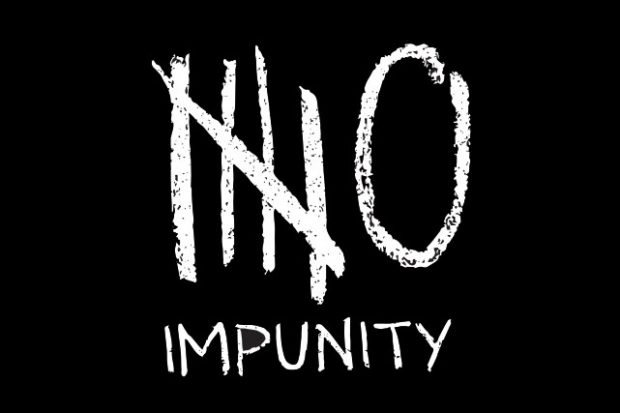
Since 2004, over 700 journalists have been killed for their reporting. Nine out of 10 of these cases go unpunished.
Index on Censorship’s Mapping Media Freedom platform verified a number of reports of impunity since it began monitoring threats to press freedom across Europe in May 2014. Reporters Without Borders also tracks cases of violence against journalists in its annual press freedom barometer and its end-of-year round-up of journalists killed worldwide.
“The brutal murder of Daphne Caruana Galizia on 16 October is a stark reminder of the dangers journalists face for reporting in the public interest. Pressure must be brought to bear on government officials in all countries to ensure that crimes against journalists do not go unpunished,” Hannah Machlin, project manager for Mapping Media Freedom, said.
Impunity, which is defined as the exemption from punishment or paying reparation for a crime, goes hand-in-hand with authorities’ inaction when investigating both violent and nonviolent actions against journalists.
“Violence against journalists and impunity for their attackers has become all too common in many parts of the world, and alarmingly, is on the rise in Europe, particularly in cases of journalists investigating corruption. We reiterate our call for the creation of a UN Special Representative for the Safety of Journalists to address this vicious cycle”, said Rebecca Vincent, UK Bureau Director for Reporters Without Borders.
To condemn such crimes, increase accountability and defend the rights of media professionals, the United Nations General Assembly proclaimed 2 November as the ‘International Day to End Impunity for Crimes Against Journalists’ in 2013. It has since been observed to raise awareness of impunity and condemn violence against the media.
AZERBAIJAN
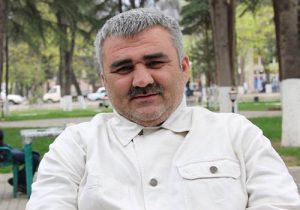
Azerbaijani journalist Afgan Mukhtarli
On 29 May 2017, investigative journalist and government critic Afgan Mukhtarli disappeared on his way home in Tbilisi, Georgia. Mukhtarli reappeared the next day across the border in Azerbaijan and was accused of illegal border crossing, resisting police and smuggling when police allegedly found €12,000 on his person. He was immediately sentenced to three months in pre-trial detention.
This case is unique in that it is the first cross-border operation alleged to be accompanied by the Georgian government. Azerbaijani lawmaker and a member of the Parliament Human Rights Committee Elman Nasirov claimed Mukhtarli’s kidnapping was “the most successful operation carried out in recent years”. Nasirov also accused him of being a member of a broader anti-Azerbaijan network. As a preventive mechanism, Nasirov claimed that Azerbaijani special forces made necessary arrangements with Georgian special forces.
Police have questioned political activists, members of opposition parties, and journalists as part of the investigation. Sevinc Vagifqizi, a freelance reporter, was detained while waiting outside the state border services where Mukhtarli was being held. Other journalists who have been questioned in the case of Mukhtarli are investigative journalist Khadija Ismayilova, who is facing a travel ban despite her release from jail, and more recently, Aytac Ahmadova.
The circumstances of Mukhtarli’s arrest were also notable for the suspicious injuries he sustained. Outside of his abduction, Mukhtarli’s lawyer reported that he had suffered a broken nose, multiple bruises and a possible broken rib.
BELARUS
On 12 March 2017, Adarya Hushtyn, the editor for BelaPAN news agency, arrived from Minsk to the town of Orsha in the Vitsebsk region of Belarus to cover a protest against the tax on the unemployed which was to be held in the early afternoon.
When she arrived that morning, she was stopped at the railway station by the commander of the riot police squad to check her documents and press card. She was then detained by police officers together with Nasha Niva newspaper correspondent Siarhei Hoodzilin who had arrived to cover the same protest.
At the police station, both journalists were searched and informed that they were being checked for in the database of wanted people. Hushtyn was detained at the police station for nearly three hours without any explanation. She was only released after the protest she intended to report on was over.
Hushtyn filed a complaint against her illegal detention and was told that she was mistaken for another woman who was also wanted by the police. As it turned out, this woman was not only unlike the journalist but was found two weeks prior to Hushtyn’s detention. She also filed an application to the prosecutor’s office to initiate a criminal case under Article 198 of the Criminal Code of the Republic of Belarus “preventing from lawful professional activity of a journalist”, but was refused.
In March 2017, the Belarusian Association of Journalists (BAJ) made an appeal to the Minister of Home Affairs calling on the authorities to investigative the mass violations of journalists’ rights. The reply was that police officers did not violate any law and that BAJ “has to stop ‘covering up’ and ‘justifying’ the people who have nothing to do with mass media”.
In March alone, 94 reporters were detained and 6 were beaten by the police while covering nationwide protests.
CZECH REPUBLIC
In April 1992, Václav Dvořák was shot and killed in front of his home. Dvořák was a journalist who uncovered information regarding František Mrázek, a controversial Czech entrepreneur once believed to be the boss of the Czech mob. Dvořák both published his reports locally or passed them along to national distributors. There are thirteen other murders thought to be linked to Dvořák’s.
After more than fourteen years, police identified Dvořák’s killer as gangster Bohuslav Hájek, who is believed to have been ordered by Mrázek to carry out the murder. However, Hájek disappeared in 2001 and it is believed that he was also murdered as an inconvenience and a witness to Mrázek’s operations.
GERMANY
On 6 July 2017 in Hamburg, Germany, police assaulted a number of journalists at the G20 protests.
Of the 35 investigations launched, 27 are accusations of assault perpetrated by police officers. At this time, none of the attackers have been arrested or convicted.
“There has been no police brutality,” Olaf Scholz, the mayor of Hamburg, claimed days after the protests during a televised interview.
On 8 July 32 journalists had their accreditation revoked by federal police without explicit reasoning. This launched an investigation by federal police, who discovered police files against the journalists contained incorrect information. Although there were errors made in police documents, it is unclear if the journalists have regained accreditation.
Journalists who lost accreditations include photographer Björn Kietzmann, Rafael Heygster (Weser Kurier), photographer for Junge Welt, Willi Effenberger Alfred Denzinger (Beobachter News), photographer Chris Grodotzki (Spiegel Online), Adil Yigit (Avrupa Postasi), editor Elsa Koester (Neues Deutschland) and freelance photographer Po Ming Cheung.
HUNGARY
On 15 July 2016 investigative journalist Csaba Móricz was insulted and then chased by the mayor of Érpatak, Orosz Mihály Zoltán, in a car. Earlier that day, Móricz went to Érpatak to document a city council meeting where he expected to ask questions to the mayor regarding a series of financial irregularities that he had uncovered.
At the beginning of the council meeting, instead of opening, the mayor launched into a fifteen-minute speech about the journalist, declaring him a “media rat” and “secret agent” several times, insinuating that Móricz lied about the financial situation in Érpatak for money. Two men then entered the room, one of which was Richárd Fügedi, a councillor of the far-right party Jobbik. One of the men then started threatening the journalist and asked: “Are you going to push me, Mr Móricz?“
The journalist left and drove away from the meeting, but soon realised that his vehicle was being followed by a group of three other cars – two of which belonged to the mayor‘s office. All cars involved were driving above the speed limit towards a nearby town when the journalist noticed a police patrol and decided to stop and ask for protection.
The police officers, instead of protecting the journalist, checked Móricz’s ID in the midst of a group of five people, including Mayor Zoltán and a second Jobbik MP. The group filmed the incident despite the journalist requesting they stop when his personal details, including his home address, were read aloud. Móricz had to insist to the police officers that they escort him to safety after initially being refused.
Just one month later, the authorities have opened an investigation against Móricz for breaking the speed limit. The investigation began when the website he works for wrote that he had to speed up to 140-150 km/h to escape his followers.
ITALY
Cosimo Cristina was born in Termini Imerese, an industrial village not far from Palermo, in 1935. He started working in the local newspaper L’Ora di Palermo when he was twenty. Later, he became a freelance contributor for several national newspapers and for the ANSA news agency.
In the late 1950’s, Cristina started to collect information about the clans of the Cosa Nostra, or the Sicilian mafia, in Palermo and Termini Imerese. In 1959 he published a new magazine titled “Prospettive Siciliane” (Sicilian Perspectives) with his friend Giovanni Capuzzo to cover stories on the mafia. This is when he started receiving death threats.
On 3 March 1960, he did not return home from work. Two days later, his corpse was discovered near to the railway, his skull broken. In his pockets he carried an ID and two letters; one for his fiancé and one for Capuzzo. In these letters Cristina begged for forgiveness for taking his own life. For the police it was a suicide and the case was closed. There was no further investigation or handwriting analysis on the letters found at the scene.
Five years later, police officer and expert on the Sicilian mafia Angelo Mangano began a new investigation. He knew Cristina had written several articles probing into the world of the Cosa Nostra. Mangano requested an autopsy on the corpse but the results confirmed the suicide, despite the doubts.
MALTA

Daphne Caruana Galizia
On 16 October at around 3pm, Daphne Caruana Galizia was killed when the car she was driving exploded in Bidnija in what is thought to have been a targeted attack. Galizia filed a police report 14 days prior saying that she was being threatened.
“The barbaric murder of Daphne Caruana Galizia is an attack on journalism itself. This crime is meant to intimidate every investigative journalist,” said Dr Lutz Kinkel, managing director of the European Centre for Press and Media Freedom.
“Because prime minister Joseph Muscat and parts of Malta’s political elite were targets of Galizia’s disclosures, we strongly recommend an independent investigation of this case. The killers have to be found and put on trial.”
On 17 October, Galizia’s family filed an application to Magistrate Consuelo Scerri Herrera to abstain from investigating the case because of the court’s “flagrant conflict of interest”. Galizia and the magistrate share a history of conflict and critique.
Galizia has conducted numerous high profile corruption investigations and has been subject to dozens of libel suits and constant harassment. Because of her research, in February, her bank assets were frozen following a request filed by the economic minister.
Galizia has made numerous opponents in the Maltese government and business world and has investigated and linked such high officials as opposition leader Adrian Deliato offshore accounts and alleged prostitution, real estate investment owner Silvio Debono to public land takeover and Prime Minister Joseph Muscat and his wife to hiding payments from Azerbaijan.
London: Vigil for Daphne Caruana Galizia
Join us to mark the International Day to End Impunity for Crimes Against Journalists by joining a vigil mourning the death of Maltese investigative journalist Daphne Caruana Galizia, who was murdered on Monday 16 October.
When: Thursday 2 November 1-2pm
Where: Malta High Commission, Malta House, 36-38 Piccadilly, Mayfair, London W1J 0LE (Map)
MONTENEGRO
On 1 November 2007 Tufik Softic, a Montenegrin journalist and reporter for the opposition daily newspaper Vijesti, was brutally beaten in front of his home in Berane by two hooded assailants wielding baseball bats. About six years later in August 2013, an explosive device was thrown into the yard of Softic’s family home. It was not until 2014 and broad international pressure on Montenegro that both cases began formally investigating.
On 17 July 2014, police arrested two men in the town of Budva under the suspicion of involvement in the attacks against Softic. After questioning by the state prosecutor, who also confiscated their passports, the men were released on the same day.
Ten years after the initial attack in February 2017, Softic filed a lawsuit against the state for ineffective investigation. The lawsuit claims that the state is responsible for mental pain and fear which Softic suffered and will suffer because of the danger of re-attack, the Trade Union of Media of Montenegro reported. The state, TUMM continued, “encouraged attackers by ineffective investigation and eventually, its ending”.
After years of stalemate, Softc initiated the trial for compensation for non-pecuniary damage related to human rights violations. He has since been awarded €7,000 as compensation for the ineffectual investigation and mental suffering he endured, becoming the first in Montenegro’s history to do so. Softic’s case is emblematic of the atmosphere of impunity in Montenegro and the broader Balkan region.
RUSSIA
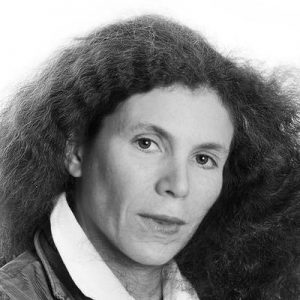
Yulia Latynina (Twitter)
After multiple life-threatening attacks, Yulia Latynina fled Russia. The columnist, contributor and writer works for independent newspaper Novaya Gazeta, as well as radio station Echo Moskvy.
“I have left Russia in connection with threats to my life,” Latynina wrote on Twitter on 10 September. A week before on 3 September, her car was set on fire and completely destroyed. On July 2017 the journalist’s car and parent’s house were sprayed with noxious gas which led to the poisoning of eight people in the surrounding area. In a third incident on August 2016, faeces were poured onto Latynina while she was on her way to work at Echo Moskvy station.
In all three cases, a proper investigation was not carried out and the perpetrators were not found.
Also in Russia, on 9 March 2016, an attack was made on a minibus carrying journalists and human rights activists, near the border between Ingushetia and Chechnya. After no suspects had been identified, the investigation was suspended in February 2017. Although Ingushetia resumed the investigation after a public backlash, no progress has been made.
SERBIA
Three controversial murder cases from the nineties and early 2000’s remain unresolved in Serbia, with the most well-known case being the murder of journalist and newspaper publisher Slavko Ćuruvija outside of his apartment in Belgrade in 1999. It is believed that the order came from senior secret service officials during the regime of strongman Slobodan Milošević. Four former state security officials have been on trial for the murder as of December 2014, which continues to progress slowly. The lack of closure to the case after nearly two decades shows the perpetuation of state impunity in Serbia even after regime change.
The suspicious death of journalist Dada Vujasinović in 1994 also remains unsolved. Vujasinović is believed to have been murdered because of her published articles regarding war criminal Željko Ražnatović, better known as Arkan. She was found dead in her apartment in 1994. The police ruled it a suicide and nobody has been arrested or prosecuted to this day.
The third case is that of Večernje Novosti journalist Milan Pantić, who was murdered in 2001. He reported on criminal affairs and official corruption. As of June 2017, the police investigation had finally been completed and suspects have been identified, awaiting a trial. All three of these cases are being investigated by an independent commission established in 2013.
UKRAINE

Pavel Sheremet (Photo: Ukrainska Pravda)
Journalist Pavel Sheremet‘s killing in a car bombing in Ukraine’s capital city on July 20, 2016, cast a chill over the country’s press corps, and the ongoing impunity for those behind the crime has continued to affect journalists’ ability to cover sensitive subjects.
Sheremet was killed when the car he was driving exploded in Kyiv. In a statement, Ukrainian police said that an explosive device detonated at 7.45am as Sheremet was driving to host a morning programme on Radio Vesti, where he had been working since 2015.
The car belonged to Sheremet’s partner, journalist Olena Prytula, who co-founded Ukrainska Pravda with murdered journalist Georgiy Gongadze.
Sheremet had been imprisoned by Belarusian authorities in 1997 for three months before being deported to Russia. Though stripped of his citizenship in 2010, he continued to report on Belarus on his personal website. He moved to the Ukrainian capital in 2011 to work for the newspaper Ukrainska Pravda.
There have been no arrests in the journalist’s murder.[/vc_column_text][/vc_column][/vc_row][vc_row][vc_column][vc_row_inner][vc_column_inner width=”1/2″][vc_single_image image=”80577″ img_size=”full” onclick=”custom_link” link=”https://www.balcanicaucaso.org/bloc-notes/Impunita-dei-crimini-contro-i-giornalisti-una-scelta-politica”][/vc_column_inner][vc_column_inner width=”1/2″][vc_column_text]
696 è il numero esatto di professionisti dell’informazione uccisi dal 2007 ad oggi nel mondo, secondo i dati raccolti dal Comitato per la Protezione dei Giornalisti (CPJ).[/vc_column_text][/vc_column_inner][/vc_row_inner][vc_row_inner][vc_column_inner width=”1/2″][vc_single_image image=”96211″ img_size=”full” onclick=”custom_link” link=”https://www.indexoncensorship.org/2017/10/targeting-journalists-name-national-security/”][/vc_column_inner][vc_column_inner width=”1/2″][vc_column_text]
As security – rather than the protection of fundamental rights and freedoms – becomes the number one priority of governments worldwide, broadly-written security laws have been twisted to silence journalists.[/vc_column_text][/vc_column_inner][/vc_row_inner][vc_row_inner][vc_column_inner width=”1/2″][vc_single_image image=”96229″ img_size=”full” onclick=”custom_link” link=”https://www.indexoncensorship.org/2017/10/turkish-injustice-scores-journalists-rights-defenders-go-trial/”][/vc_column_inner][vc_column_inner width=”1/2″][vc_column_text]
About 90 journalists, writers and human rights defenders will appear before courts in the coming days[/vc_column_text][/vc_column_inner][/vc_row_inner][vc_row_inner][vc_column_inner width=”1/2″][vc_single_image image=”96183″ img_size=”full” onclick=”custom_link” link=”https://www.indexoncensorship.org/2017/10/interpol-the-abuse-red-notices-is-bad-news-for-critical-journalists/”][/vc_column_inner][vc_column_inner width=”1/2″][vc_column_text]
Since August, at least six journalists have been targeted across Europe by international arrest warrants issued by Turkey, Azerbaijan, Uzbekistan and Kazakhstan[/vc_column_text][/vc_column_inner][/vc_row_inner][vc_custom_heading text=”Mapping Media Freedom” use_theme_fonts=”yes”][vc_separator color=”black”][vc_row_inner][vc_column_inner width=”1/4″][vc_icon icon_fontawesome=”fa fa-times-circle” color=”black” background_style=”rounded” size=”xl” align=”right”][/vc_column_inner][vc_column_inner width=”3/4″][vc_column_text]
Since 24 May 2014, Mapping Media Freedom’s team of correspondents and partners have recorded and verified over 3,600 violations against journalists and media outlets.
Index campaigns to protect journalists and media freedom. You can help us by submitting reports to Mapping Media Freedom.[/vc_column_text][/vc_column_inner][/vc_row_inner][/vc_column][/vc_row][vc_row][vc_column][vc_custom_heading text=”Don’t lose your voice. Stay informed.” use_theme_fonts=”yes”][vc_separator color=”black”][vc_row_inner][vc_column_inner width=”1/2″][vc_column_text]Index on Censorship is a nonprofit that campaigns for and defends free expression worldwide. We publish work by censored writers and artists, promote debate, and monitor threats to free speech. We believe that everyone should be free to express themselves without fear of harm or persecution – no matter what their views.
Join our mailing list (or follow us on Twitter or Facebook) and we’ll send you our weekly newsletter about our activities defending free speech. We won’t share your personal information with anyone outside Index.[/vc_column_text][/vc_column_inner][vc_column_inner width=”1/2″][gravityform id=”20″ title=”false” description=”false” ajax=”false”][/vc_column_inner][/vc_row_inner][vc_separator color=”black”][/vc_column][/vc_row]
[vc_row][vc_column][vc_custom_heading text=”From broadcasting uprisings to employing Russian spies, Radio Free Europe brings news to poorly served regions. In the autumn 2017 issue of Index on Censorship magazine, Sally Gimson looks at the station’s history and asks if it is still needed today”][/vc_column][/vc_row][vc_row][vc_column][vc_column_text]

Gregory Baldwin / Ikon
In Georgia, the future of Radio Free Europe, and sister station Radio Liberty, is looking precarious. This summer the Georgian government’s central broadcaster shut down two of RFE/RL’s most popular political programmes. The broadcaster said it was part of a wider restructure, but civil society organisations condemned the move and suggested the station wanted to eliminate critical viewpoints. The move and the subsequent outcry highlight the role RFE continues to play, namely to often act as a platform for free expression in parts of Europe where these values are strained.
Radio Free Europe and Russian station Radio Liberty, which it merged with, have been broadcasting to eastern Europe and Russia since 1950. While its remit originally was to fight communism, it now states its function as serving the cause of democracy more generally.
Today in Chechnya, for example, RFE is the only station where you will hear reports from journalists and stringers in the Chechen language about the influence of Isis and the persecution of gay people. It is the only Western international station operating in Moldova, even if it broadcasts for only a few hours a day. In Armenia, its TV provides a counterbalance to government-controlled media, as well as broadcasting to the wider diaspora. And in Kazakhstan, it provided special coverage of the early parliamentary election last year with six hours of live-streamed video on its website.
John O’Sullivan, executive editor of RFE between 2008 and 2012, argues passionately that “the radios”, as he calls the stations, have key roles to play in making sure people have a strong source of news and hear different viewpoints, and in holding governments to account with local journalists reporting on the ground.
“At the moment, there is a moral war between all these countries and the argument that commercial stations can do this job is fine, except they can’t do the job of the radios,” he told Index. “CNN is … never going to have a lot of correspondents in Armenia and never going to have correspondents in Chechnya. It’s going to be doing a story once every three months. Those audiences need it every day.”
Originally set up as an intelligence services-led project, RFE aimed to counter what the US government saw as superior propaganda coming out of the Soviet Union. Although primarily funded by the CIA, it was promoted to the US public as a project for truth and freedom to which they should contribute. Future US president Ronald Reagan, a young actor in the early 1950s, fronted up the public service advertisement, encouraging donations with the exhortation: “This station daily pierces the Iron Curtain with the truth, answering the lies of the Kremlin and bringing a message of hope to millions trapped behind the Iron Curtain.”
Victoria Phillips, who runs the RFE research project at Columbia University, told Index: “These men [who founded RFE] … really did believe in the power of truth and freedom of ideas, and when I read about some of those people, you don’t like the fact that they tried to invade places, and they had coups, but in the end the core was a belief in the power of ideas, and if ideas are allowed to vent then good will take place…”[/vc_column_text][vc_row_inner][vc_column_inner width=”1/3″][vc_icon icon_fontawesome=”fa fa-quote-left” color=”custom” align=”right” custom_color=”#dd3333″][/vc_column_inner][vc_column_inner width=”2/3″][vc_custom_heading text=”RFE was accused of encouraging insurgents to believe the USA would intervene on their behalf militarily” google_fonts=”font_family:Libre%20Baskerville%3Aregular%2Citalic%2C700|font_style:400%20italic%3A400%3Aitalic”][/vc_column_inner][/vc_row_inner][vc_column_text]In the beginning, the broadcasts used émigrés and dissidents for their programmes. They spoke from the headquarters in Munich to their countrymen and women in their own languages and were broadcast on short wave radios, which were widely accessible. It was an alternative source of news to the official Soviet broadcasters.
During the Cold War RFE was also a hotbed of spies, double agents and political resistance. The Bulgarian novelist and playwright Georgi Markov was assassinated in London with the tip of a poisoned umbrella in part because of his RFE In Absentia programme. Markov had dined with the communist elite and knew all about their lives. He revelled in satirising them and the absurdity of the system for his audience back home. According to the communist government he “insolently mocked” the regime and “encouraged dissidence”.
When O’Sullivan was executive director RFE/RL, he remembers the Iranian secret service taking pictures of the Iranian journalists coming into the offices, then in Prague, in an effort to intimidate them. “We know in a general way that some of the countries had agents embedded in the service which broadcast to them. We didn’t know who they were obviously. And in one particular case, in the Russian service, [there was] a man who had defected [back to Russia]. He had been in RFE during the Cold War and he defected and went to work for Radio Moscow and he subsequently wrote a tell-all memoir in which he had to confess that journalistic standards in Radio Moscow were well below the standards in Radio Free Europe, or in his case Radio Liberty.”
Later, RFE played an instrumental role in the fall of the USSR. As writer Irena Maryniak explained in an article for Index in 2010: “Western radios became a forum for dissenting views and personalities: people like Václav Havel (later president of the Czech Republic); the Russian physicist and civil rights activist Andrei Sakharov; the Polish historian Adam Michnik; or indeed maverick party members like Boris Yeltsin, who broadcast on Radio Liberty when he was out of favour with colleagues at home.”
Today, many of the 23 countries where RFE works are areas where the USA still wants foreign policy influence. It broadcasts across a huge range of media, not just radio. And the languages and countries the station covers, from the Caucasus and the Balkans to Afghanistan via Iran and Pakistan, read like a map of East-West tension.
Indeed, the congressionally funded Broadcasting Board of Governors, which has openly funded RFE since the 1970s and pours $117 million of taxpayers’ money into the service, is robust about its “soft power” intentions. Its 2016 budget report contains headings such as Countering a Revanchist Russia. And the report explicitly links broadcasting with foreign policy priorities.
So can we trust its journalism? The answer from O’Sullivan is yes. It’s not constrained to put the US view in the same way as Voice of America, and it actively seeks to encourage free speech and news coverage in countries where this is underdeveloped or difficult. Indeed, many reporters risk their lives to report for RFE, such as Khadija Ismayilova, who was imprisoned in Azerbaijan for exposing the president’s link to corruption. She was awarded the Unesco/Guillermo Cano World Press Freedom Prize in 2016 for her fearless work for the station. The station also won two prizes at the New York Festivals’ International Awards this spring, including one for the Kyrgyz service’s short video feature A Snowy Trek on Horseback to Teach School.[/vc_column_text][/vc_column][/vc_row][vc_row][vc_column width=”1/3″][vc_icon icon_fontawesome=”fa fa-quote-left” color=”custom” align=”right” custom_color=”#dd3333″][/vc_column][vc_column width=”2/3″][vc_custom_heading text=”The people who were broadcasting suddenly realised that there were huge ramifications if you promised, or seemed to promise, something and it didn’t come true.” google_fonts=”font_family:Libre%20Baskerville%3Aregular%2Citalic%2C700|font_style:400%20italic%3A400%3Aitalic”][/vc_column][/vc_row][vc_row][vc_column][vc_column_text]There have been darker moments at RFE, the most famous being its reporting on the Hungarian uprising of 1956 when at least 2,500 people were killed and many more were forced into exile, imprisoned and deported. RFE was accused of encouraging insurgents to believe the USA would intervene on their behalf militarily and therefore making people risk their lives unnecessarily. A couple of its programmes offered tactical military advice, and one commentary told people not to give up their weapons.
George Urban, the director of the Radio Free Europe division at the time, admitted they got it wrong. He said: “The radio was young and inexperienced. After barely five years of broadcasting, its management was still testing the instruments and boundary lines of the Cold War and was simply not up to the task of responding with clarity or finesse to its first great challenge. Hungary, its baptism of fire, cost it dear.”
As Phillips said: “The people who were broadcasting suddenly realised that there were huge ramifications if you promised, or seemed to promise, something and it didn’t come true. That people were going to die; your friends were going to die.”
Despite these controversies, RFE has survived, in part because the US Congress has continued to invest in the European operation, if on a smaller scale than during the Cold War. But O’Sullivan believes “the radios” should be given a lot more money and are needed more than ever to compete with stations like Russia Today (with a budget of about $300 million in 2016) and Al Jazeera.
“I think that people will accept there is an argument for good journalism which gives the news about their own country to people whose country would like to deprive them of it, and good journalism which sets standards to which we hope the journalists in transitioning countries will aspire and gradually achieve,” he said.
This article was updated on 1 November 2017 to include additional information.[/vc_column_text][vc_row_inner][vc_column_inner][vc_column_text]This article first appeared in the Autumn 2017 issue of Index on Censorship magazine, an award-winning, quarterly magazine dedicated to fighting for free expression and against censorship across the globe since 1972. You can subscribe here or via Exact Editions here. [/vc_column_text][/vc_column_inner][/vc_row_inner][/vc_column][/vc_row][vc_row][vc_column][vc_custom_heading text=”From the Archives”][vc_row_inner][vc_column_inner width=”1/3″][vc_single_image image=”89160″ img_size=”213×289″ alignment=”center” onclick=”custom_link” link=”http://journals.sagepub.com/doi/pdf/10.1177/0306422011399691″][vc_custom_heading text=”Surviving Lukashenko ” font_container=”tag:p|font_size:24|text_align:left” link=”url:http%3A%2F%2Fjournals.sagepub.com%2Fdoi%2Fpdf%2F10.1177%2F0306422011399691|||”][vc_column_text]March 2011
James Kirchick looks at the climate for alternative media in the aftermath of the 2010 Belarus elections.[/vc_column_text][/vc_column_inner][vc_column_inner width=”1/3″][vc_single_image image=”94267″ img_size=”213×289″ alignment=”center” onclick=”custom_link” link=”http://journals.sagepub.com/doi/pdf/10.1080/03064228208533431″][vc_custom_heading text=”Extolling the communist party” font_container=”tag:p|font_size:24|text_align:left” link=”url:http%3A%2F%2Fjournals.sagepub.com%2Fdoi%2Fpdf%2F10.1080%2F03064228208533431|||”][vc_column_text]October 1982
Janis Sapiets questions whether Soviet broadcasting is partaking in censorship or responsibility to the party. [/vc_column_text][/vc_column_inner][vc_column_inner width=”1/3″][vc_single_image image=”94034″ img_size=”213×289″ alignment=”center” onclick=”custom_link” link=”http://journals.sagepub.com/doi/pdf/10.1080/03064228308533503″][vc_custom_heading text=”Censorship in retreat” font_container=”tag:p|font_size:24|text_align:left” link=”url:http%3A%2F%2Fjournals.sagepub.com%2Fdoi%2Fpdf%2F10.1080%2F03064228308533503|||”][vc_column_text]April 1983
Hungary’s best-known novelist writes on the craving in Eastern Europe for communication and exchanges of ideas.[/vc_column_text][/vc_column_inner][/vc_row_inner][vc_separator][/vc_column][/vc_row][vc_row][vc_column width=”1/3″][vc_custom_heading text=”Free to air” font_container=”tag:p|font_size:24|text_align:left” link=”url:%20https%3A%2F%2Fwww.indexoncensorship.org%2F2017%2F09%2Ffree-to-air%2F|||”][vc_column_text]Through a range of in-depth reporting, interviews and illustrations, the autumn 2017 issue of Index on Censorship magazine explores how radio has been reborn and is innovating ways to deliver news in war zones, developing countries and online
With: Ismail Einashe, Peter Bazalgette, Wana Udobang[/vc_column_text][/vc_column][vc_column width=”1/3″][vc_single_image image=”95458″ img_size=”medium” alignment=”center” onclick=”custom_link” link=”https://www.indexoncensorship.org/2017/09/free-to-air/”][/vc_column][vc_column width=”1/3″][vc_custom_heading text=”Subscribe” font_container=”tag:p|font_size:24|text_align:left” link=”url:https%3A%2F%2Fwww.indexoncensorship.org%2Fsubscribe%2F|||”][vc_column_text]In print, online. In your mailbox, on your iPad.
Subscription options from £18 or just £1.49 in the App Store for a digital issue.
Every subscriber helps support Index on Censorship’s projects around the world.
![]() SUBSCRIBE NOW[/vc_column_text][/vc_column][/vc_row]
SUBSCRIBE NOW[/vc_column_text][/vc_column][/vc_row]